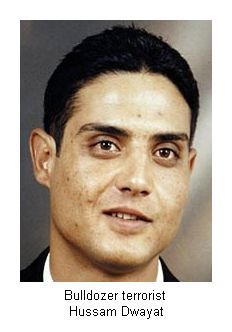 In the immediate aftermath of the Palestinian bulldozer rampage, which killed three Israelis and injured dozens more, HonestReporting focused on the headlines on the BBCs website. The headlines went from “Israel bulldozer driver shot dead” to “Bulldozer rampage hits Jerusalem” and finally settled on “Deadly Jerusalem bulldozer attack.”
In the immediate aftermath of the Palestinian bulldozer rampage, which killed three Israelis and injured dozens more, HonestReporting focused on the headlines on the BBCs website. The headlines went from “Israel bulldozer driver shot dead” to “Bulldozer rampage hits Jerusalem” and finally settled on “Deadly Jerusalem bulldozer attack.”
The BBC, however, was not the only media outlet that raised eyebrows with its coverage. Numerous news outlets, including newspapers that provided otherwise honest and fair coverage of the day’s events, placed surprising emphasis on the attacker’s motives to humanize him and “explain” his actions.
The British Daily Telegraph for example, noted that the attacker, Hussam Dwayat, “never recovered from a doomed romance with a young Jewish woman.” The Toronto Star added that Dwayat “had been fined $50,000 for building his house without a permit, and a demolition order was on file…That might explain Dwaiths motivation in the attack.”
A Jerusalem Post editorial took a good look at some of the other offenders:
Why did Hussam Taysir Dwayat do it? The hasty and erroneous answer offered by an overwhelming number of news outlets amounted to: “It’s the occupation, stupid.” That is the type of “context” one would expect from Al-Jazeera, which described the rampage as an “operation.”
Yet even the otherwise fine coverage provided by The New York Times was marred, apparently by editors, who inserted a tendentious paragraph about… bulldozers: “Caterpillar equipment has a special resonance among Palestinians. Human rights activists have lobbied the company to stop selling its heavy vehicles to the Israeli military out of concern that they have been used to demolish Palestinian homes, uproot orchards and construct Jewish settlements in occupied land.”
Reuters unhelpfully contrasted Israel’s supposed oppression of Palestinians generally with its maltreatment of Jerusalem Arabs: “Unlike Palestinians in the blockaded Gaza Strip and in the occupied West Bank, those living in occupied east Jerusalem have free access to the Jewish west of the city and to Israel.” The wire service added that it found no evidence that Dwayat was a “guerrilla.”
Meanwhile, the BBCs coverage of the bulldozer attack did elicit an apology… but not the one we would have liked. While BBC news editor Craig Oliver explained his decision to air the footage, the BBC instead apologized for showing images of the killing of the terrorist in the bulldozer, saying it was wrong to screen the video and that the images failed to strike the right editorial balance.
Jerusalem Post columnist Caroline Glick noted that the bulldozer attack was only the second Palestinian attack on Israelis to be preserved on film – the first was the bloody lynching of two IDF reservists in the first days of the second Intifada in 2000. Both cases, she added, drew apologies from the networks that showed them.
In this case, as in the case of the lynching eight years ago, the reason the BBC apologized is not because the film’s images were too gruesome, but because it strayed from the accepted narratives of the Palestinian war against Israel. To maintain the narratives, “the right editorial balance between the demands of accuracy and the potential impact on the program’s audience,” is one that engenders the belief that Israel is either morally indistinguishable from the Palestinians, or that Israel is morally inferior to the Palestinians.
ARABIC STUDIES PROMOTING PROPAGANDA
A great deal has been written about Palestinian textbooks teaching anti-Israel attitudes and showing maps of the region that leave Israel out. Apparently, the problem is not limited to textbooks in the Middle East. The Washington Post published Joel Pollak’s look at a textbook called “Al-Kitaab”, used in beginner’s Arabic courses at Harvard and other major American universities, and his disturbing discoveries:
Most maps of the Middle East in “Al-Kitaab” do not include Israel, though a substantial minority of Israelis, both Jews and Arabs, are native Arabic speakers. Alongside simple Arabic poems, students read about anti-Western heroes such as Gamal Abdel Nasser.
The DVD that comes with “Al-Kitaab” includes footage of Nasser’s mass rallies in Cairo — including slogans in Arabic and French such as “Brother Nations in Struggle, We Are By Your Side.” These scenes of totalitarian rage are fondly described by the narrator as “dreams of his youth.”
The accompanying lesson describes the highlights of Nasser’s career, including the nationalization of the Suez Canal and the formation of the United Arab Republic. No mention is made of Egypt’s defeat in the Six-Day War or of Nasser’s brutal, repressive rule. In my class, we were asked to recite a passage about Nasser to practice our vocalization. (I refused.)
The last lesson in the book — which we skipped — features Maha’s mother speaking wistfully of her childhood in Palestine: “My childhood was taken from me!” Over mournful music on the DVD, she talks about returning to Jerusalem, as if she were a refugee, but the images suggest that she left voluntarily after the Six-Day War, when Israel offered citizenship to the Arab residents of East Jerusalem. The fact that Israel also claims Jerusalem as its capital is ignored.

